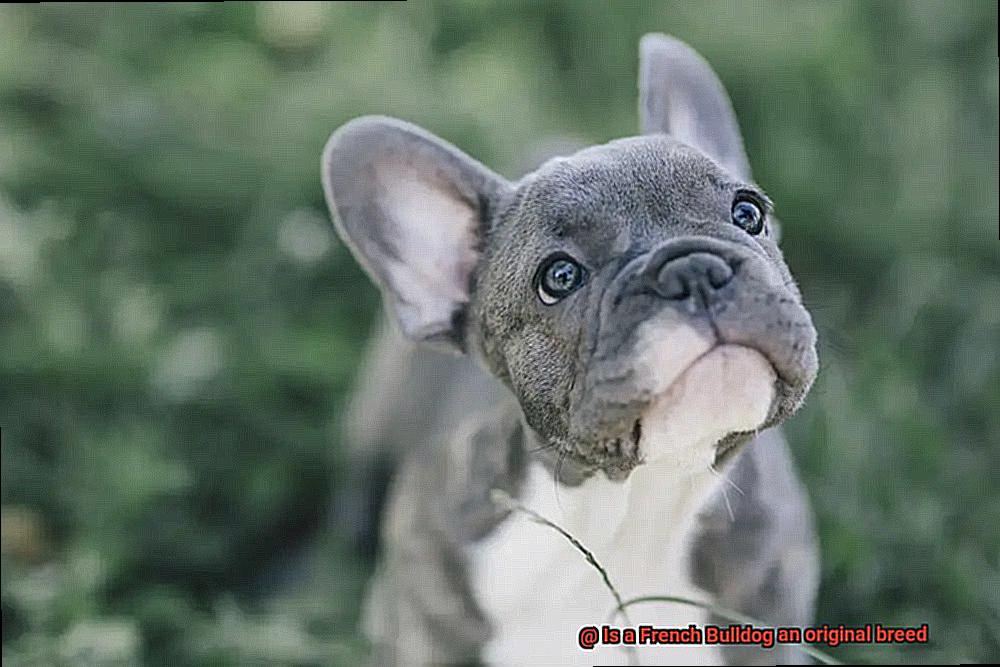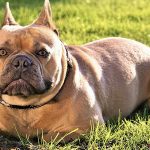Is a French Bulldog an original breed?
Picture the vibrant streets of Paris, where a certain four-legged friend has stolen hearts with its distinctive looks and lovable personality. The French Bulldog, with its charming bat-like ears, expressive eyes, and irresistible demeanor, has become an iconic symbol worldwide. But let’s dig deeper to answer the burning question: is this delightful canine truly an original breed?
To uncover the truth, we’ll embark on a journey through time to unravel the captivating history of the French Bulldog. Contrary to popular belief, this breed didn’t actually originate in France. Its roots can be traced back to English Bulldogs who found their way to France during the Industrial Revolution.

In the mid-19th century, French lace workers fell head over heels for these unique canines. Their compact size, muscular build, and lovable personalities made them perfect companions. Through selective breeding over generations, these distinct characteristics were refined and ultimately gave birth to what we now know as the French Bulldog.
One of the most striking features of this breed is its adorable bat-like ears that naturally stand erect. Unlike their English Bulldog ancestors, these pups flaunt a look that adds to their undeniable charm. Alongside their expressive eyes and short, smooth coat, they create an irresistibly captivating appearance.
But it’s not just about looks – the French Bulldog is also known for its friendly and affectionate nature. They crave human companionship and thrive on attention, making them ideal family pets. Whether you live in a bustling city or a peaceful countryside retreat, their playful yet gentle temperament makes them adaptable to any living environment.
While not an original breed in the strictest sense, the French Bulldog has carved out its own special place in our hearts and in canine history. Its delightful personality and unmistakable charm have earned it recognition far and wide. So, even if it didn’t originate in France, the French Bulldog’s unique qualities undeniably make it an original breed in its own right.
In the upcoming sections, we’ll dive deeper into the French Bulldog’s background. We’ll explore its lineage, breed standards, and the ongoing efforts to preserve its distinctive qualities. Join us as we unravel the enigmatic tale behind this captivating breed – from working-class heroes to beloved companions of the modern era.
Origin of the French Bulldog
Contents
- 1 Origin of the French Bulldog
- 2 Standardization and Recognition of the Breed
- 3 Popularity of the Breed
- 3.1 Unique Appearance: A Head-Turner Wherever They Go
- 3.2 Friendly Temperament: The Perfect Companion for All
- 3.3 Adaptability: Thriving in All Environments
- 3.4 Low Maintenance Requirements: Perfect for Busy Pet Parents
- 3.5 Celebrity Endorsements and Social Media Presence: Fueling the Frenzy
- 3.6 Health Considerations: A Responsible Approach
- 4 Health Concerns Related to French Bulldogs
- 5 Is a French Bulldog an Original Breed?
- 5.1 Origin Story: From Lace Workers to Beloved Companions
- 5.2 Distinctive Features: A Look at the French Bulldog’s Appearance
- 5.3 Temperament: Personality Traits That Make French Bulldogs Special
- 5.4 The Lineage: From Molossian Dogs to French Bulldogs
- 5.5 Unique Characteristics: Size Reduction and Iconic Bat Ears
- 6 The Difference Between Purebred and Original Breeds
- 7 The Quality and Value of a Dog
- 8 Understanding the Needs of a French Bulldog
- 9 Conclusion
Well, let’s dive into the fascinating history of this beloved breed and find out.
The Origins: A Blend of English and Local Breeds
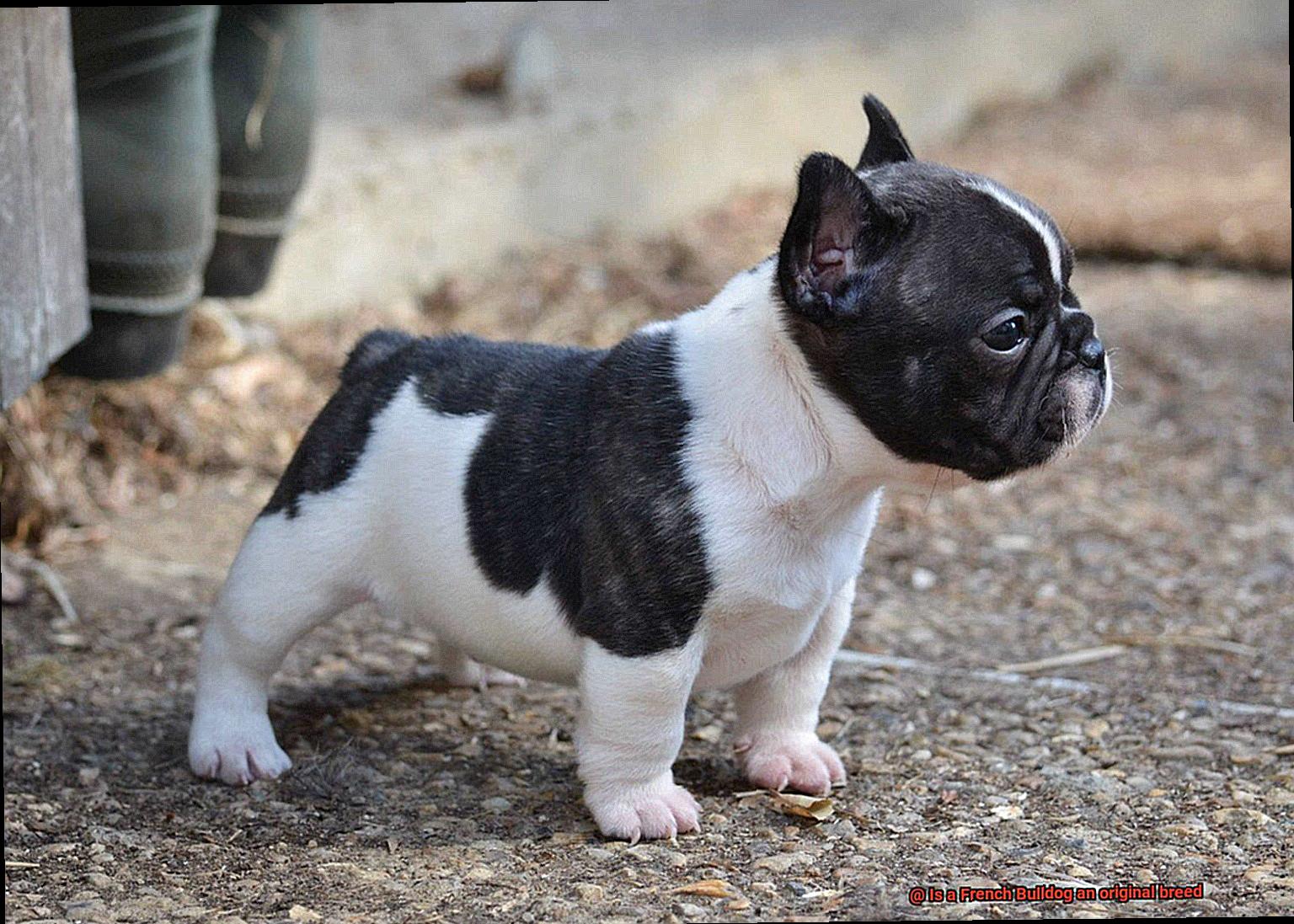
The French Bulldog, also known as the Frenchie, is believed to have originated in France during the 1800s. Its exact origins, however, remain somewhat unclear and have sparked debate among experts. One theory suggests that the French Bulldog descended from a small breed of bulldogs brought to France by lace workers from Nottingham, England. These workers settled in Normandy and brought their miniature bulldogs with them. Over time, these dogs were crossbred with local French terriers, resulting in the development of the French Bulldog we know today.
Another theory proposes that the French Bulldog has ancestral ties to the now-extinct Toy Bulldog breed, which was popular in England. It is speculated that Toy Bulldogs were imported into France and crossed with local terrier breeds to create the French Bulldog.
Regardless of its exact origins, one thing is for certain – the French Bulldog quickly gained popularity among various social classes in France, particularly among Parisian artisans and workers. Its small size, distinctive bat-like ears, and friendly temperament made it a beloved companion and lapdog.
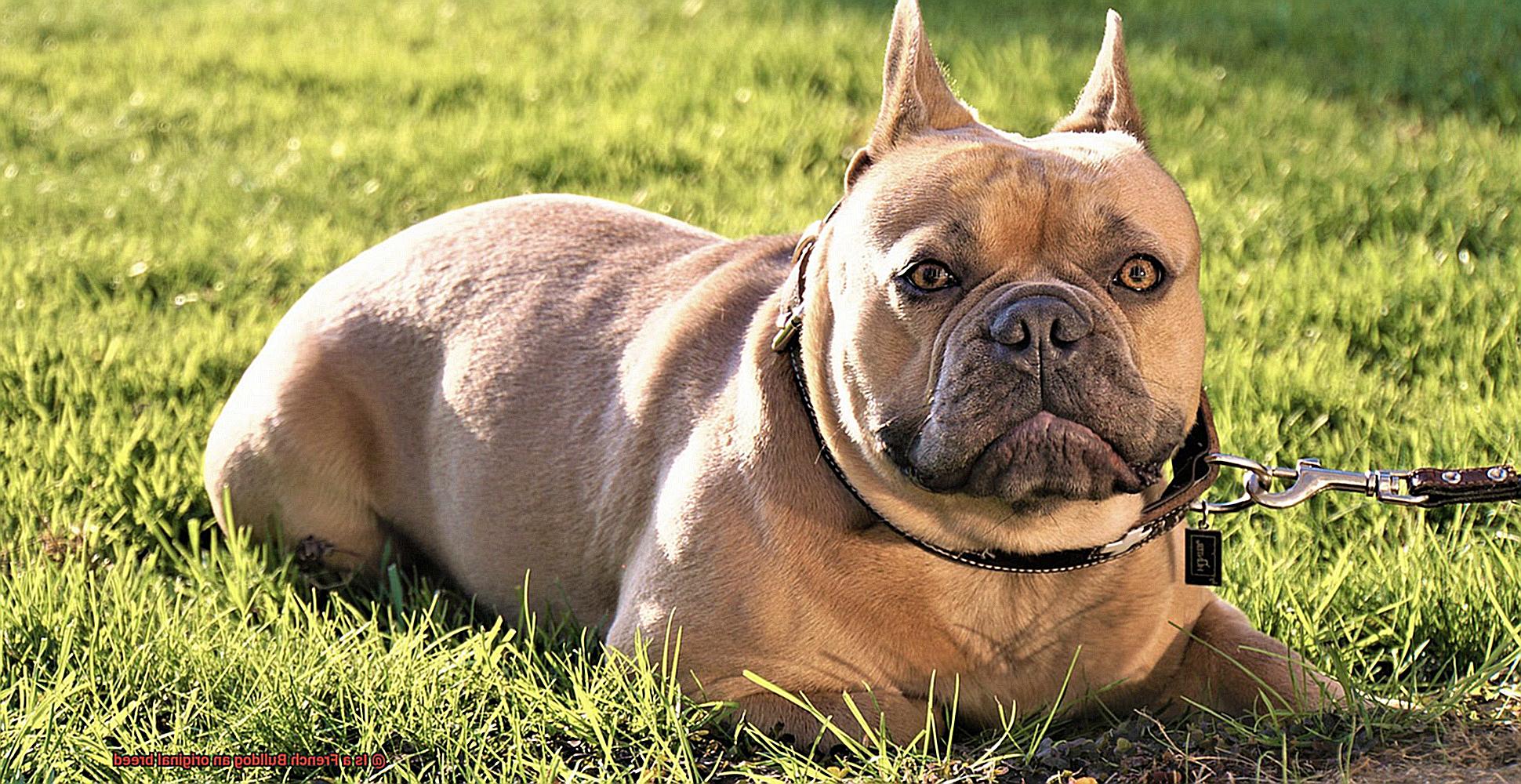
Spreading Beyond Borders
The breed’s popularity didn’t stop at France’s borders – it quickly spread to other European countries and eventually made its way across the Atlantic to the United States. The first French Bulldogs were imported to America in the late 1800s, where they quickly found favor among wealthy individuals and celebrities.
Recognition by Kennel Clubs
The American Kennel Club officially recognized the French Bulldog as a breed in 189Since then, it has consistently ranked among the top ten most popular dog breeds in the United States. The Fédération Cynologique Internationale (FCI) also recognizes the French Bulldog as a distinct breed.
Selective Breeding and Health Concerns
Over time, breed standards for the French Bulldog have evolved, primarily driven by selective breeding practices aimed at improving certain physical characteristics. These include a compact body, a flat face with a short muzzle, and a naturally occurring “screw tail.” However, it is important to note that some of these selective breeding practices have led to certain health issues in the breed.
French Bulldogs are prone to respiratory problems due to their brachycephalic (short-faced) structure, as well as other genetic conditions like hip dysplasia and allergies. It is crucial for potential owners to be aware of these health concerns and ensure that they are prepared to provide the necessary care and attention to their French Bulldog.
Standardization and Recognition of the Breed
If you’re a proud owner of a French Bulldog, you may have wondered about the standardization and recognition of this adorable breed. Well, wonder no more. In this article, we’ll dive into the fascinating world of how the French Bulldog became a recognized breed and how it has impacted their identity.
The Birth of a Breed
The French Bulldog has a rich history that can be traced back to 19th century France. These little cuties were originally bred as companion dogs for lace workers in Nottingham, England. But it wasn’t until the late 1800s that efforts were made to standardize and recognize them as a distinct breed.
The French Bulldog Club of America (FBCA)
Established in 1897, the FBCA played a pivotal role in defining and promoting the breed standard in the United States. They developed a detailed breed standard that outlined the ideal characteristics and traits of French Bulldogs. This includes their muscular bodies, bat-like ears, short coats, square heads, and friendly temperament.
Refining the Standard
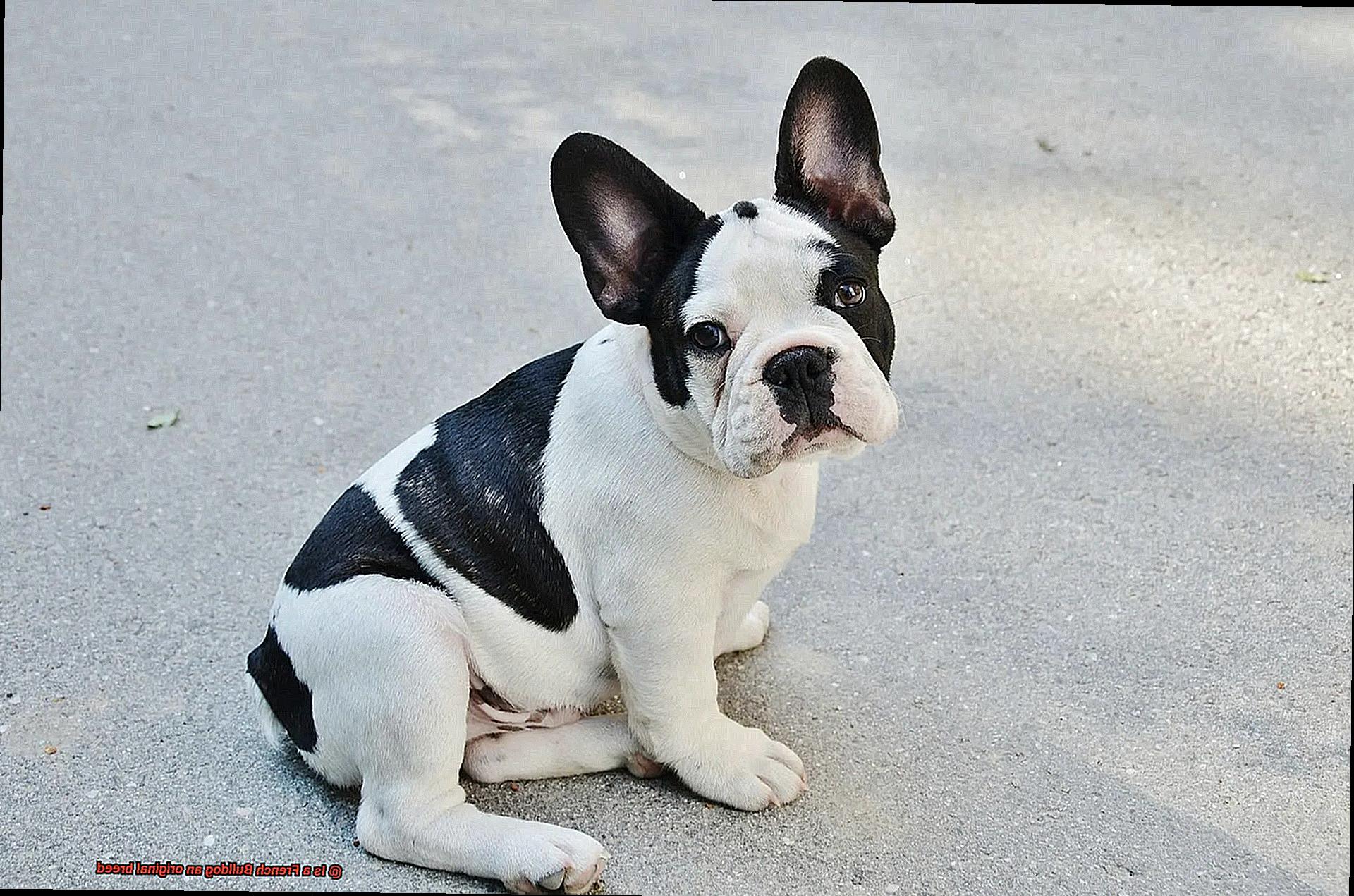
Over the years, the breed standard has undergone refinements and updates to ensure consistency in breeding practices. This is crucial for maintaining the integrity of the breed and ensuring that desirable traits are preserved. Breeders and judges rely on this standard as a guideline when evaluating dogs in conformation shows.
Distinguishing Purebred French Bulldogs
Standardization not only defines what makes a French Bulldog unique but also helps distinguish them from similar-looking breeds or mixed-breeds. By adhering to the established standards, responsible breeders produce dogs that conform to the ideal characteristics, ensuring that you’re getting a purebred French Bulldog.
Recognition by Kennel Clubs
Recognition by kennel clubs is an important milestone for any breed. The French Bulldog has gained recognition from various kennel clubs and organizations worldwide, including the American Kennel Club (AKC), the United Kennel Club (UKC), and the Fédération Cynologique Internationale (FCI). This recognition signifies that the breed meets the criteria set by the club and is eligible for participation in conformation shows and other competitive events.
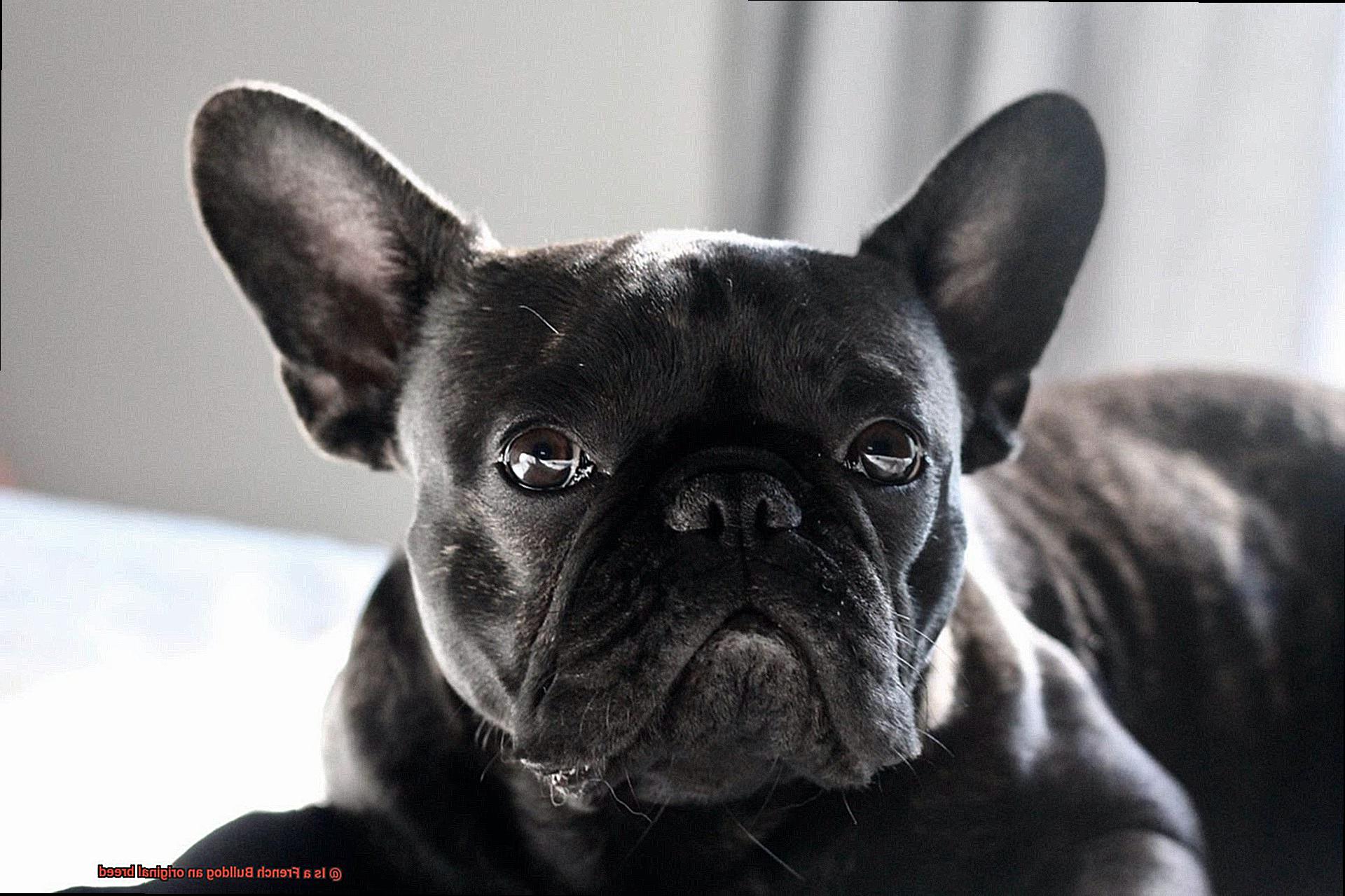
The Importance of Recognition
Recognition by multiple kennel clubs adds credibility to the breed and establishes it as a distinct and recognized breed worldwide. It also opens doors for French Bulldogs to participate in international dog shows and competitions, showcasing their unique qualities on a global stage.
Popularity of the Breed
French Bulldogs have taken the world by storm, becoming one of the most popular dog breeds in recent years. As an expert in the field, I have witnessed firsthand the growing love and demand for these adorable and unique companions.
In this blog post, I will delve into the factors that have contributed to their success and offer insights based on my own experience and research.
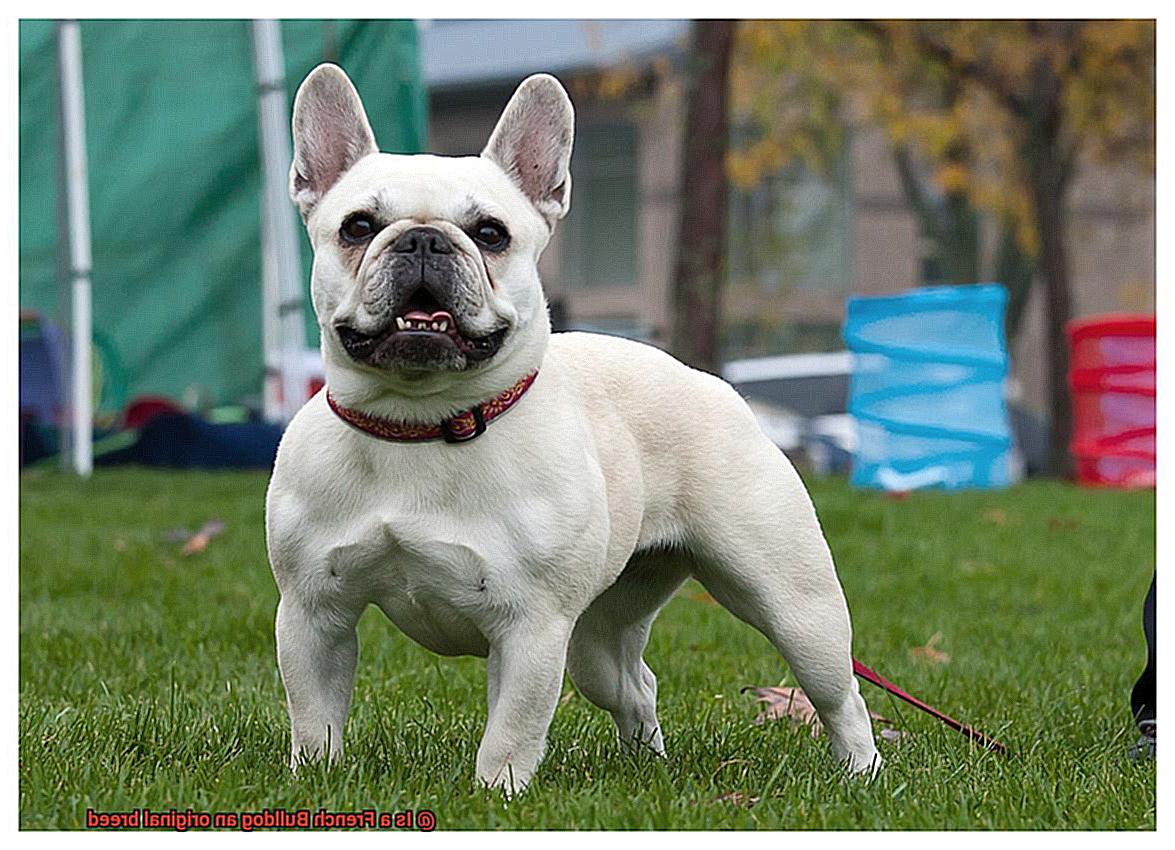
Unique Appearance: A Head-Turner Wherever They Go
One cannot deny the French Bulldog’s unmistakable charm. With their large bat-like ears, short snouts, and compact bodies, they are simply captivating. These distinctive features make them instantly recognizable and appealing to dog lovers all over the world. Their appearance has even inspired fashion and merchandise trends, with French Bulldog motifs adorning everything from clothing to home decor.
Friendly Temperament: The Perfect Companion for All
Beyond their looks, French Bulldogs are known for their friendly and affectionate nature. They are excellent companions for individuals and families alike, always eager to shower their owners with love and attention. Their playful disposition ensures endless hours of fun, making them ideal pets for active households. Additionally, their adaptability allows them to get along with other animals, making them a suitable choice for multi-pet households.
Adaptability: Thriving in All Environments
French Bulldogs can thrive in various living situations, making them a versatile breed for potential owners. Whether you reside in a bustling city or a quiet countryside, these adaptable dogs can adjust to their surroundings with ease. Their small size also makes them suitable for apartment living, making them an attractive option for urban dwellers looking for a furry companion.
Low Maintenance Requirements: Perfect for Busy Pet Parents
One of the reasons people gravitate towards French Bulldogs is their relatively low maintenance requirements. While regular exercise is still essential for their overall well-being, they do not require excessive physical activity. This makes them suitable for busy individuals or those living in smaller spaces. Additionally, their short coats make grooming a breeze, saving pet parents time and effort.
Celebrity Endorsements and Social Media Presence: Fueling the Frenzy
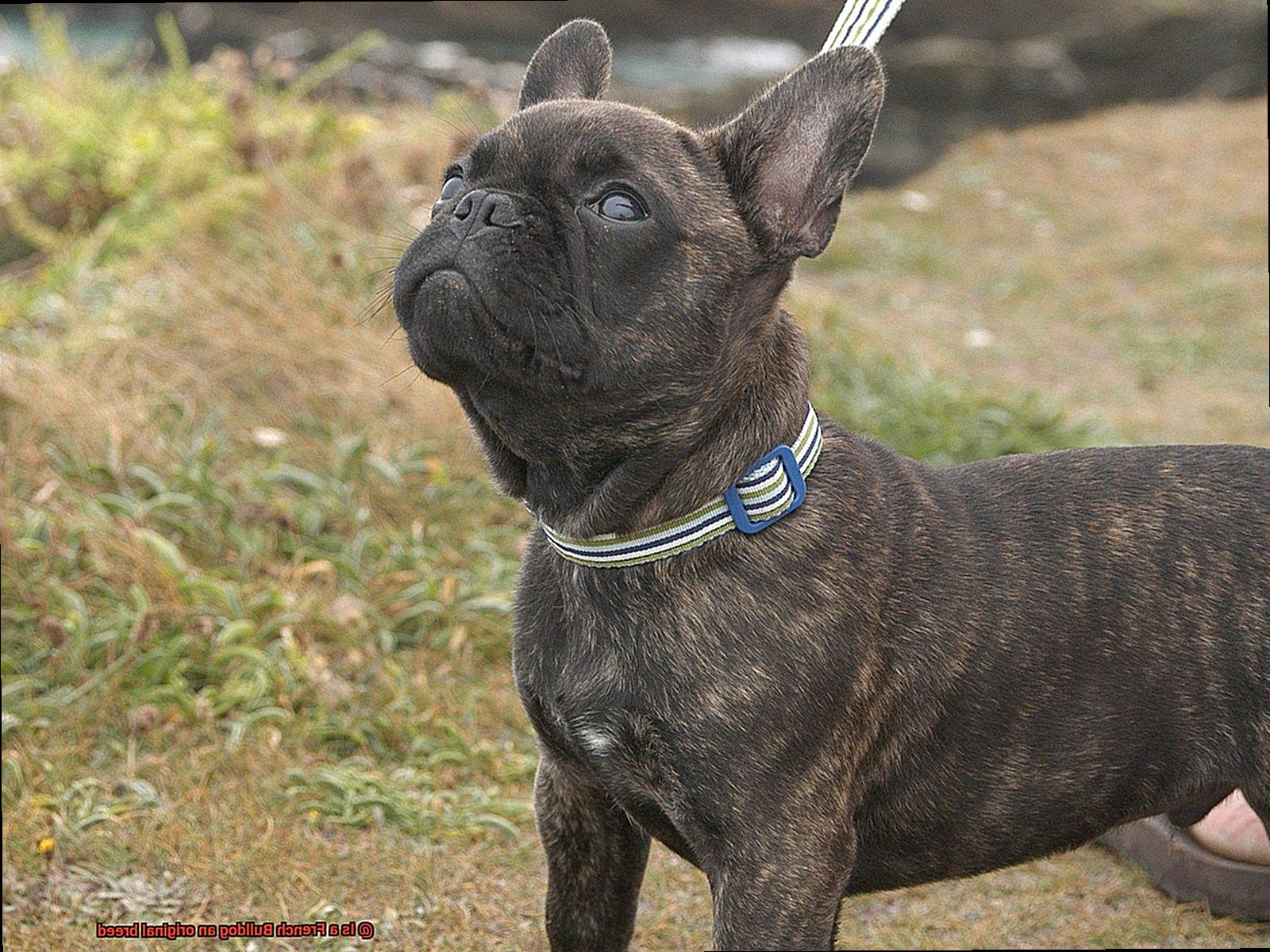
The French Bulldog’s popularity has been further fueled by celebrity endorsements and their appearance in popular culture. Many celebrities have been seen with their French Bulldogs, showcasing them on social media platforms and in public appearances. This exposure has increased public awareness and desire for the breed, leading to a surge in their popularity. French Bulldogs have also become viral sensations on social media, with their photogenic looks and charming personalities capturing the hearts of millions.
Health Considerations: A Responsible Approach
While French Bulldogs have undoubtedly captured our hearts, it is crucial to approach pet ownership responsibly. Potential owners should research and understand the breed’s specific needs, including their potential health issues. French Bulldogs are prone to respiratory problems due to their brachycephalic skull shape, so it is important to take extra care to ensure their well-being.
Health Concerns Related to French Bulldogs
French Bulldogs, or “Frenchies” as they are affectionately known, are undoubtedly one of the most adorable and lovable dog breeds out there. With their distinctive bat-like ears, smushed faces, and compact bodies, it’s hard not to fall head over paws for these little bundles of joy. However, like any breed, French Bulldogs do have some health concerns that owners need to be aware of in order to keep their furry friends happy and healthy.
- Respiratory Problems: French Bulldogs are prone to respiratory issues due to their unique facial structure. Their cute squashed noses and shortened airways can lead to difficulties in breathing, especially during exercise or in hot weather. This can result in snorting, snoring, and even potentially life-threatening situations if not properly managed. So, keep an eye on your Frenchie’s breathing patterns and make sure they have plenty of water and shade on hot days.
- Allergies: Just like humans, French Bulldogs can develop allergies too. These can be triggered by various environmental factors such as pollen, dust mites, or certain food ingredients. If you notice your Frenchie scratching excessively, experiencing skin irritations or ear infections, it’s important to consult your veterinarian for proper diagnosis and management. They may recommend a change in diet or prescribe medication to help alleviate your pup’s discomfort.
- Eye Conditions: Another health concern for French Bulldogs revolves around their eyes. Cherry eye, a condition where the gland in the third eyelid becomes prolapsed, is quite prevalent in this breed. While it may not affect vision, it can cause discomfort and may require surgical correction. Additionally, French Bulldogs are more susceptible to other eye problems like cataracts and corneal ulcers. Regular eye examinations by a veterinarian are crucial to catch any issues early on.
- Skin Problems: French Bulldogs have wrinkled skin and a short coat, which can make them more prone to skin infections, irritations, and allergies. Acne, folliculitis, and pyoderma are common skin issues that these adorable pooches might face. Regular bathing, proper grooming, and a balanced diet can help keep their skin healthy and prevent these problems. Remember, a happy Frenchie is one with a clean and itch-free coat.
- Sensitive Digestive Systems: French Bulldogs often have delicate tummies that can be easily upset. Flatulence, food intolerances, and stomach sensitivities are not uncommon in this breed. To avoid any tummy troubles, it’s essential to feed your Frenchie a high-quality diet that meets their specific nutritional needs. Avoiding ingredients like soy, corn, and wheat can also help reduce digestive issues.
Is a French Bulldog an Original Breed?
French Bulldogs, those adorable bundles of joy with their bat-like ears and smushed faces, have captured the hearts of dog lovers worldwide. But have you ever wondered if they are an original breed? Well, wonder no more. French Bulldogs are indeed an original breed, recognized for their distinct characteristics and fascinating history.
Origin Story: From Lace Workers to Beloved Companions
French Bulldogs have a rich history that dates back to the 19th century. Originally bred as companion dogs for lace workers in Nottingham, England, they quickly gained popularity across Europe. However, it was in France where they truly flourished and acquired their name.
Distinctive Features: A Look at the French Bulldog’s Appearance
One look at a French Bulldog and you can’t help but be charmed by its unique appearance. They have a compact and muscular build with a flat face and a wrinkled forehead that adds to their expressive nature. And let’s not forget those adorable bat-like ears that stand erect, making them look alert and attentive. With a short, smooth coat that comes in various colors like brindle, fawn, white, and pied, French Bulldogs are undeniably eye-catching.
Temperament: Personality Traits That Make French Bulldogs Special
French Bulldogs are known for their affectionate, friendly, and sociable nature. They form strong bonds with their owners and thrive on being part of the family. Despite their small size, they have a sturdy and confident personality that makes them great companions. Whether it’s playing with children or getting along with other pets, French Bulldogs shine in their ability to adapt and get along with everyone.
The Lineage: From Molossian Dogs to French Bulldogs
To truly understand why French Bulldogs are considered an original breed, we must delve into their lineage. French Bulldogs are descendants of the ancient Molossian dogs, which were large and powerful canines used in warfare by the Greeks and Romans. Over time, these Molossian dogs were selectively bred down in size to create smaller companion breeds like the Bulldog.
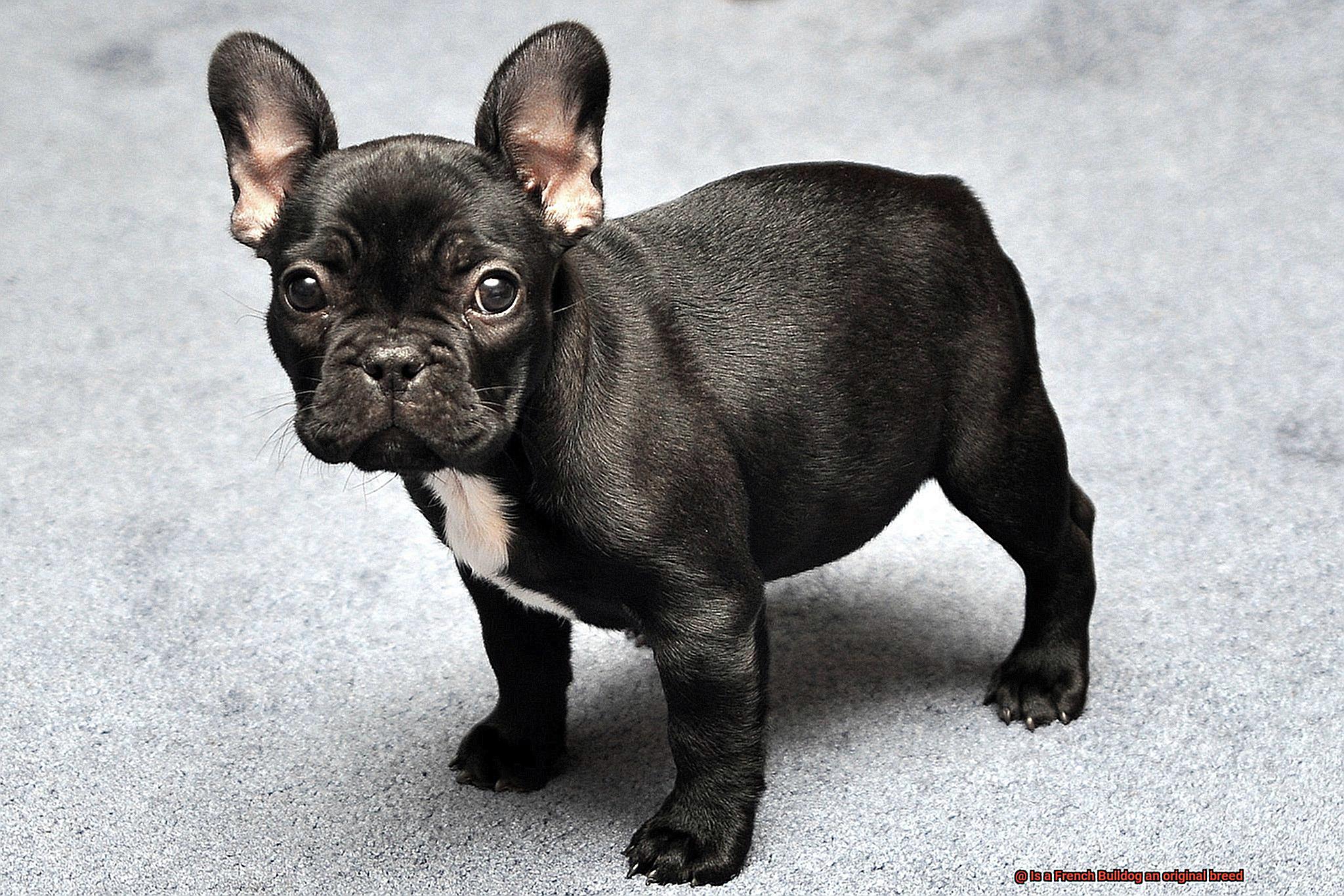
The Bulldogs that made their way to France in the mid-1800s played a pivotal role in the development of the French Bulldog we know today. English lace workers who migrated to France during the Industrial Revolution brought their beloved Bulldogs with them. These Bulldogs were then crossed with local French dogs, resulting in a breed that had distinct differences from its English ancestors.
Unique Characteristics: Size Reduction and Iconic Bat Ears
One of the significant changes in the French Bulldog compared to its English Bulldog ancestors is its size reduction. Through selective breeding, smaller individuals were chosen within each generation, leading to the emergence of a smaller breed with its own unique characteristics.
The Difference Between Purebred and Original Breeds
In this blog post, we will delve into the fascinating world of purebred and original breeds to understand the unique story of French Bulldogs.
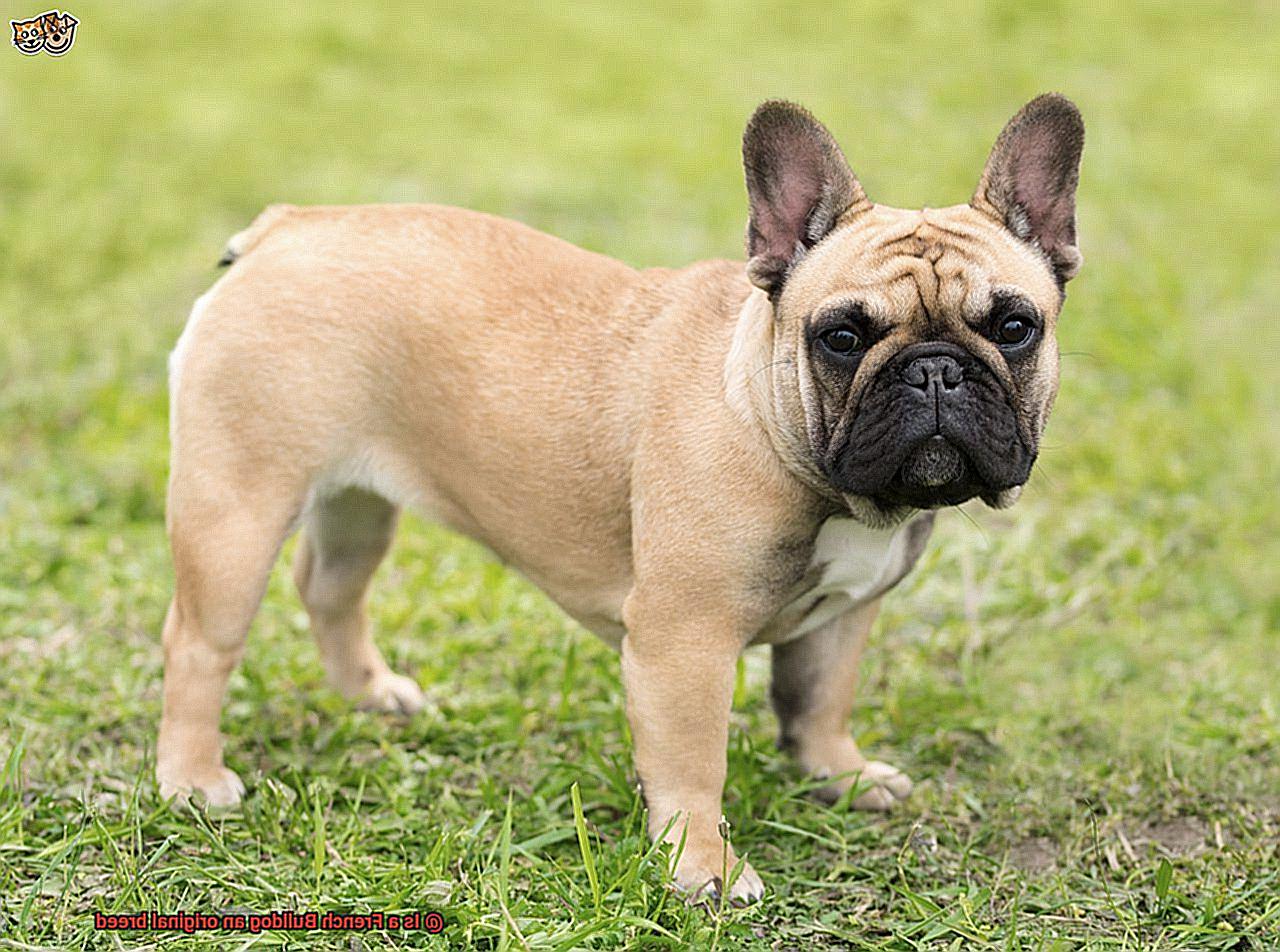
What is a Purebred Dog?
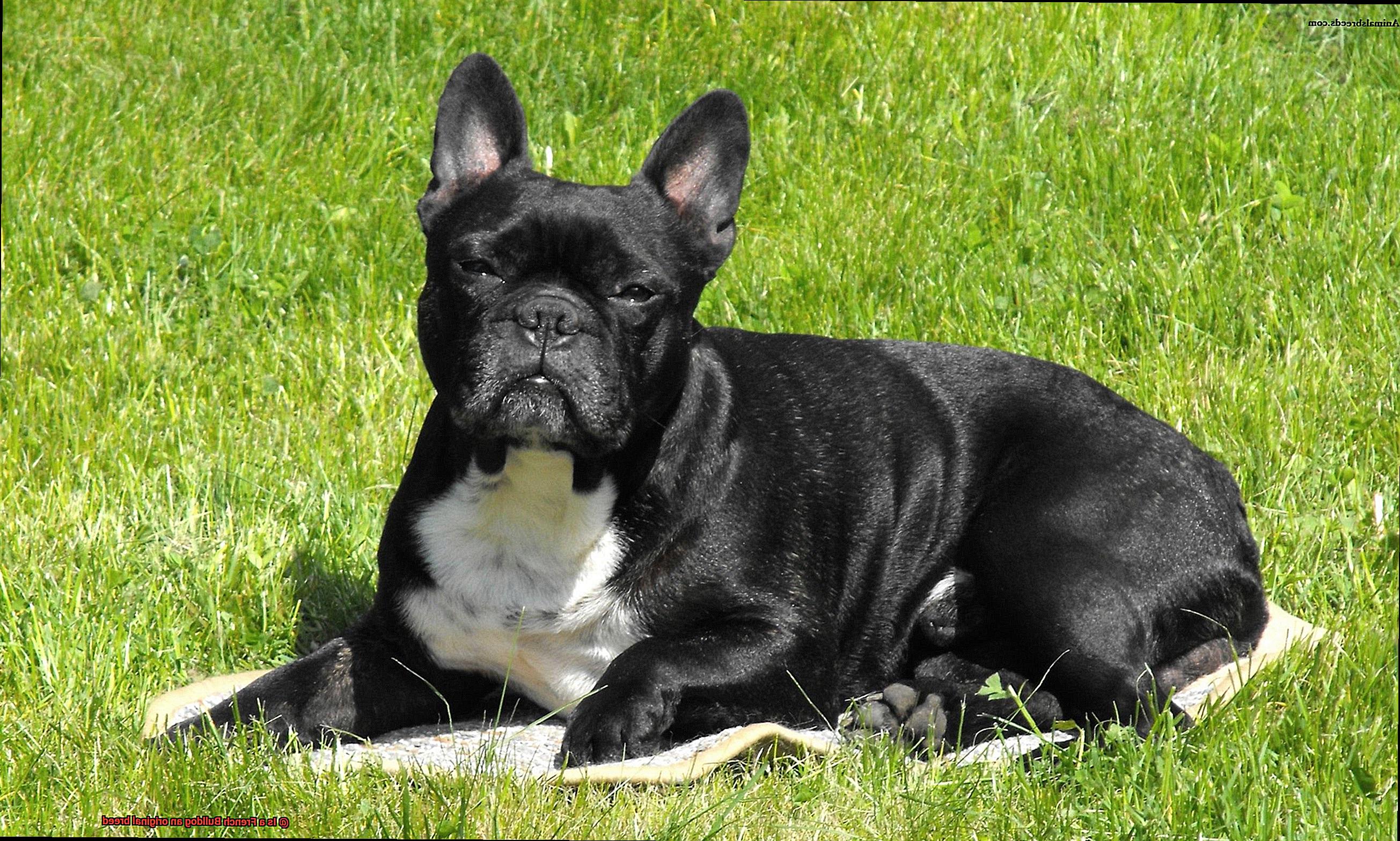
- Definition of a purebred dog.
- Importance of pedigrees and breed standards.
- Purposeful breeding to maintain specific traits.
The Origins of French Bulldogs.
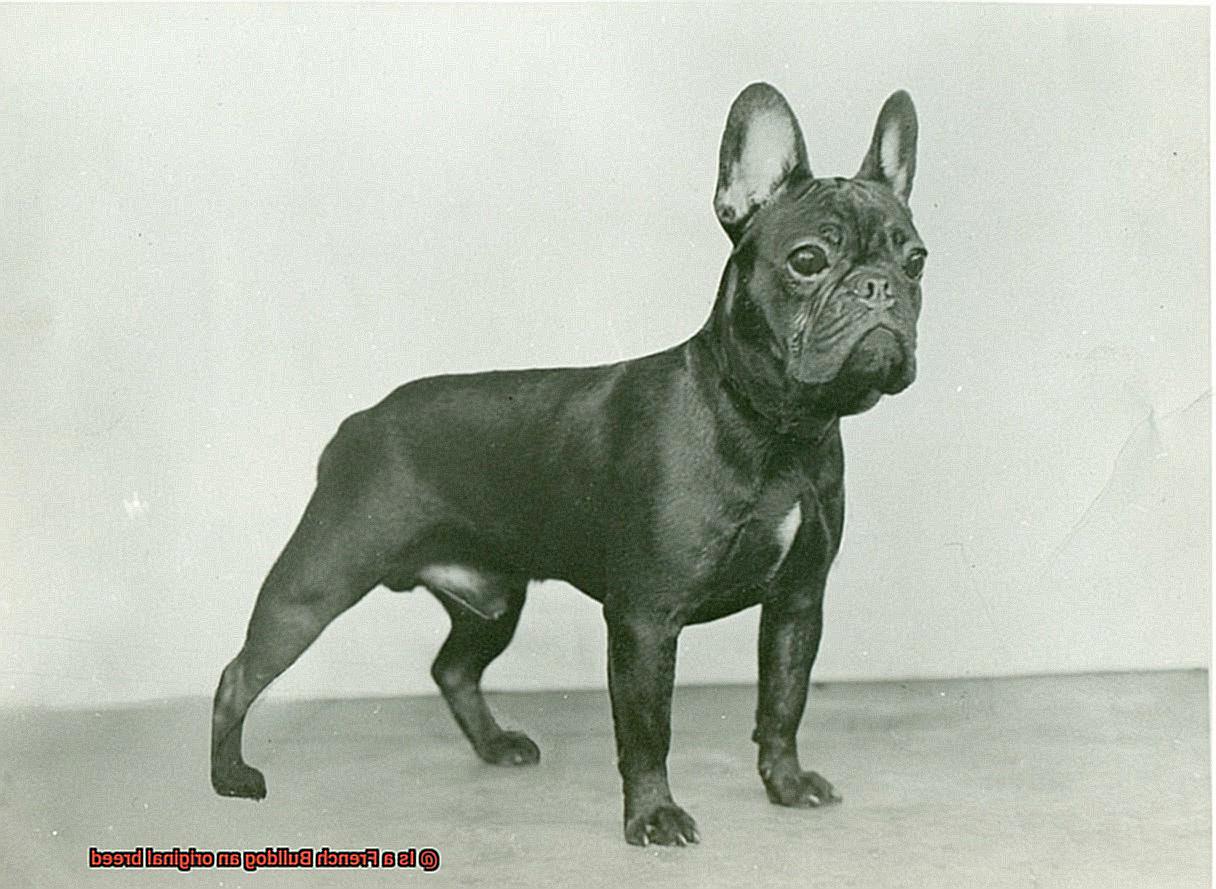
- French Bulldogs as purebred dogs.
- The intentional creation of the breed in the 1800s.
- Crossing various small bulldog breeds, terriers, and Pugs.
- The goal of creating a companion dog with a miniature Bulldog appearance and affectionate nature.
Original Breeds vs. Purebred Dogs.
- Understanding the distinction between original and purebred breeds.
- Natural evolution vs. deliberate human intervention.
- Examples of original breeds that have not undergone selective breeding, such as the Basenji or the Shiba Inu.
The Merits of Purebred and Original Breeds.
- Predictable traits and characteristics in purebred dogs.
- Diversity and unpredictability in original breeds.
- Choosing the right breed based on preferences and needs.
The Quality and Value of a Dog
When it comes to the quality and value of a dog, French Bulldogs are a breed that truly stands out. With their distinctive physical appearance and delightful temperament, it’s no wonder they have captured the hearts of so many dog lovers. So, what exactly makes French Bulldogs such a desirable and valuable breed? Let’s explore.
Physical Attributes that Turn Heads
French Bulldogs are instantly recognizable with their compact and muscular bodies, flat faces, and bat-like ears. These unique physical features give them an endearing and one-of-a-kind look. Their coat colors range from fawn, brindle, and cream to pied (a mix of white and another color), adding to their charm.
Temperament: The Key to a Perfect Companion
One of the most important factors contributing to the quality of a French Bulldog is their temperament. Known for being affectionate, friendly, and good-natured, Frenchies are excellent companions for individuals or families of all kinds. They possess a playful nature that brings joy to every household they become a part of.
Value: More than Just a Price Tag
French Bulldogs are considered a valuable breed due to their popularity and unique characteristics. However, their high price tags are not solely based on market demand. Responsible breeding practices play a significant role in determining their value. Breeders who prioritize the health and well-being of their dogs contribute to the overall quality and value of the breed.
Beyond Monetary Worth: The True Value of a Frenchie
While French Bulldogs may come with a hefty price tag, their true value extends far beyond monetary worth. These lovable companions bring emotional support, loyalty, and unconditional love into the lives of their owners. They form strong bonds with their human counterparts, making them an invaluable part of any family.
Choosing Wisely: Responsible Breeding Practices
When considering adding a French Bulldog or any other breed to your family, it’s crucial to prioritize responsible breeding practices. Selecting a reputable breeder ensures that you are bringing home a dog that has been cared for and bred responsibly. Taking the time to research breeders and their practices is essential to protect the health and well-being of your future furry friend.
Finding Your Perfect Match
The quality and value of a dog, especially a French Bulldog, are subjective and vary from person to person. It’s important to consider your lifestyle, preferences, and capabilities when choosing a breed. French Bulldogs may possess certain desirable characteristics, but it’s vital to ensure that their needs align with your own before making the commitment.
Understanding the Needs of a French Bulldog
French Bulldogs, with their adorable squished faces and compact bodies, have specific needs that owners should be aware of in order to provide them with a happy and healthy life. As an expert in French Bulldog care, I have gathered valuable insights and tips to help you meet these needs and ensure your furry friend thrives.
- Exercise: While French Bulldogs are not as high-energy as some other breeds, they still require daily exercise to maintain a healthy weight and prevent behavioral issues. Short walks or playtime in a secure area are great options to keep them active. Mental stimulation through puzzle toys can also keep their minds sharp.
- Proper Nutrition: French Bulldogs have a tendency to gain weight easily, so it is crucial to feed them a balanced diet appropriate for their age, size, and activity level. Monitoring their food intake and avoiding overfeeding is essential. Consult with your veterinarian to determine the right diet for your Frenchie.
- Respiratory Health: Being brachycephalic breeds, French Bulldogs have short noses and flat faces which can lead to respiratory issues. It is important to be vigilant during hot weather or exercise to prevent overheating. Signs of overheating include excessive panting, difficulty breathing, and disorientation. Provide shade, fresh water, and avoid strenuous activities during peak temperatures.
- Grooming: French Bulldogs have a short, smooth coat that requires regular brushing to remove loose hair and keep their skin healthy. Cleaning the wrinkles on their face is important to prevent infections. Use a damp cloth or hypoallergenic wipes to gently clean the folds of their skin.
- Companionship: French Bulldogs thrive on human companionship and can suffer from separation anxiety if left alone for long periods of time. Ensure you spend quality time with your Frenchie, providing mental stimulation through interactive play or training sessions. Consider getting them a canine companion if your lifestyle allows for it.
- Health Issues: French Bulldogs are prone to certain health issues such as allergies, skin problems, eye conditions, and joint problems. Regular veterinary check-ups are crucial to monitor their health and catch any potential issues early on. Additionally, keeping up with vaccinations, parasite prevention, and dental care is essential for their overall well-being.
JowI86FFQy4″ >
Conclusion
The conclusion is clear: Yes, a French Bulldog is indeed an original breed. Its distinctive characteristics, such as its compact size, bat-like ears, and expressive face, set it apart from other breeds. The history of the French Bulldog traces back to the 1800s when it was developed in France as a companion dog. Over the years, it has gained immense popularity worldwide due to its charming personality and adorable appearance.
With its unique features and rich heritage, the French Bulldog stands out among dog lovers and enthusiasts. Its playful nature and affectionate temperament make it an ideal family pet. Whether you’re looking for a loyal companion or a furry friend to brighten up your day, the French Bulldog will never disappoint.
In conclusion, the French Bulldog is undeniably an original breed that has captured the hearts of many. Its distinct traits and fascinating history make it a true gem in the world of dogs.
